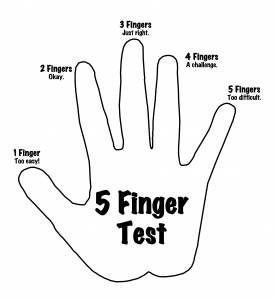How do I determine my child’s reading level?
When selecting books, parents frequently ask librarians to help them determine their child’s reading level. Often the parent actually wants to know whether a book will be too easy or too difficult for that child.
Teachers use formal assessment tools like DIBELS (Dynamic Indicators of Basic Early Literacy Skills) to determine a student’s skills and identify areas where the child might be having problems. It’s likely that your child’s teacher can tell you your child’s reading level although this assessment may be coded to match the specific assessment tool and be of little help in determining whether a specific book will be too hard for your child. Within the classroom books may be assigned a reading level (examples of proprietary leveled reading programs include Lexile and Accelerated Reader) and your child may be assigned to read books at specific levels. There are also readability tests that calculate the readability by using a formula that is applied to a calculation of variants like words in a sentence and syllables in words. Keep in mind that these tests only consider the book’s difficulty, not the age-appropriateness of the book’s content.
Books like those recommended on ReaderKidz usually have a broad reading range and what you really want is an on-the-fly way to determine if your child is likely to struggle with a book that is too difficult.
A popular and quick informal assessment of difficulty is The Five Finger Test.This works best for chapter books that have a reasonable amount of text and few or no pictures on the page.
Ask your child to read a page from the book. When a difficult word is encountered the child folds down one finger. If the child encounters five words that are difficult, the book is probably too difficult. If the child encounters only one or no difficult words, then the book is probably too easy. A book with two or three difficult words on the page is generally just right.
Remember that interest is a major factor in reading success. A child may struggle with some words or encounter words he or she doesn’t understand — just as adults do when reading — but persevere because the topic is compelling. Dinosaur books, for example, generally test for higher reading levels but many very young children can read the scientific names with ease! The important thing with reading for pleasure is to keep it pleasurable. If your child is struggling with difficult words and not enjoying the book, find another one and keep reading fun!
struggle with some words or encounter words he or she doesn’t understand — just as adults do when reading — but persevere because the topic is compelling. Dinosaur books, for example, generally test for higher reading levels but many very young children can read the scientific names with ease! The important thing with reading for pleasure is to keep it pleasurable. If your child is struggling with difficult words and not enjoying the book, find another one and keep reading fun!











